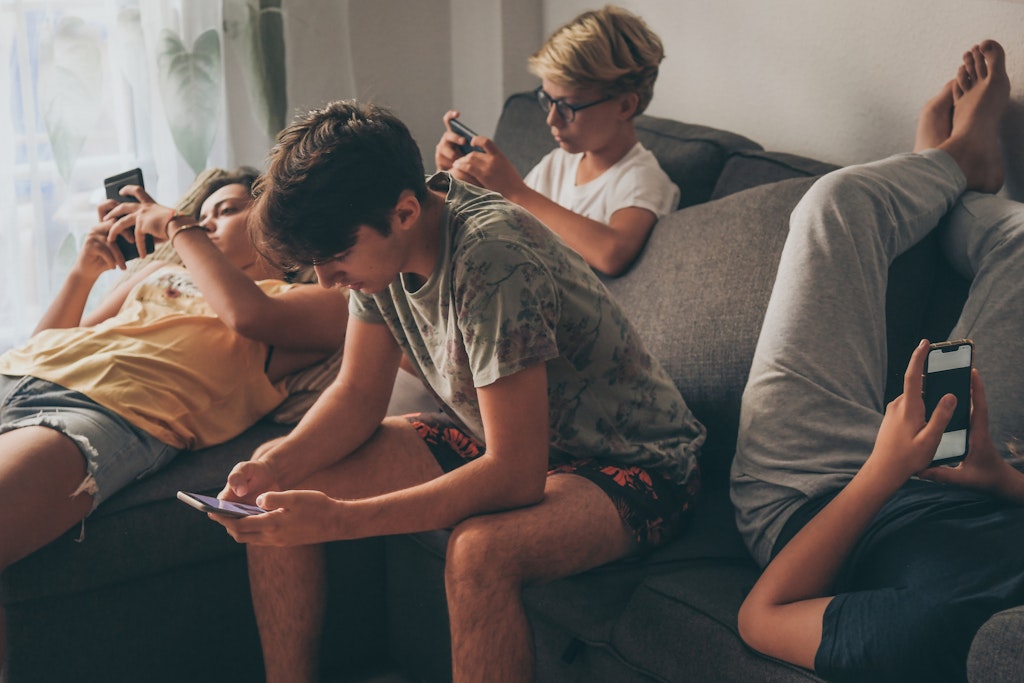From the bus to the upmarket restaurant, we want our children to sit still and shut up
From the headlines, you’d think parents and teachers had got the message about smartphones. Each week another school bans them, or reports on the miraculous effects of having already done so. Smartphone Free Childhood has 150,000+ UK members. Jonathan Haidt’s The Anxious Generation is an international bestseller and is a book of the year for the FT, the WSJ, NYT, the Economist, and Barack Obama. To read the paper/newsfeed, it feels like the battle has been won, or at the very least that the tide has turned.
But if my corner of South East London is representative, most parents haven’t noticed any of this. Children of all ages and all backgrounds are on their phones all the time. On the bus, I see mothers every day who have given their child — or even baby — a device to keep them quiet. Usually it’s the mother’s phone. Sometimes the child has their own phone — around a fifth of under fives do. Child too young to hold the device themselves? No problem, you can now buy a tablet holder that attaches to the buggy.
At the local pool over half term, my children were enrolled in daily swimming lessons. Sometimes siblings had to watch and wait while their brother or sister had a lesson. But they didn’t read a book, or chat to their parent, or watch the swimmers. They played on a phone. A girl who can’t have been older than five enjoyed taking selfies while her mother congratulated as if she was mastering some essential life skill. A different mother helpfully suggested that her young daughter might like to add emojis to the messages she was sending to her friends.
The Victorians believed that children should be seen but not heard
In a nearby wealthy neighbourhood, with a plethora of private schools unbothered by the new VAT rules, if you go to a restaurant you are guaranteed to see families who have gone out to dinner together. Delightful. Except that they haven’t really gone out together, because the children are invariably plugged into an iPad and wearing headphones. This does have the advantage that the adults can talk to each other, but it also sends a brutally clear message that restaurants are boring for children, and that nobody wants to talk to them anyway so they might as well watch a film or play a game.
From the buses to the upmarket pizza restaurants, and at every point in between on the socioeconomic scale, it seems to me that children from infancy upwards are still very much on their phones. And it matters: A recent survey found 44 per cent of parents think it’s not their responsibility to teach their children how to use books — children are starting school trying to swipe at the pages. We don’t need a study to tell us that parents and children glued to their phones will be missing out on building essential communication skills (although there is a study, if you want to check). Or that time spent sitting down, staring at a screen is time not spent running around, climbing trees, drawing a picture, reading a book or — groundbreaking idea — interacting with another human being.

Just as almost 80 per cent of drivers rate their driving ability as above average, I suspect that many of us are convinced that the statistics don’t apply to our families. That we just use the screen to help us get through the occasional long journey, or to give us a small break at the end of a busy day. But if so, we’re deluding ourselves. The UK government reported last year that “the amount of time those aged 5 — 15 years old spent online rose from an average of 9 hours per week in 2009, to 15 hours per week in 2018.” When only 3 per cent of 12 year olds don’t own a smartphone, this is everybody’s problem.
The Victorians believed that children should be seen but not heard, and as modern parents we pride ourselves on being more enlightened. We employ gentle parenting, and we empathise with our child when they have a meltdown, instead of giving them a clip round the ear and telling them to get on with it. We are horrified by the parenting not just of the Victorians but of our own parents and grandparents. Thank goodness we know better, we think.
But the prevalence of screens in the chubby fingers of even our youngest children gives the lie to this delusion. What we really want is for our children to sit still and shut up. And we’ve found a way of doing it that is both socially acceptable and eagerly lapped up by the children themselves. Worse, the insidious nature of the technology means that if we later try to go out for a meal without the iPad and headphones, the children become unbearable. We — and our children — are hoist by our own petard.
Over the past hundred years or so smacking has come to be seen as unacceptable by most parents. I’m sure it happens behind closed doors, but in the decade I have spent around young families, I have not once witnessed an adult hitting a child. Whether or not the government bans social media for under 16s, whether or not our schools go phone-free, we need the same shift of opinion on screens. The way we silence our children with these devices sends them a very clear message: we don’t want to talk to you, and we don’t want to hear from you. Sit still, and be quiet. It is not, for all our modern sensibilities, so very far away from our Victorian forebears. It remains to be seen which generation’s parenting will be judged more harshly. Jonathan Haidt and his followers can’t give up just yet.







